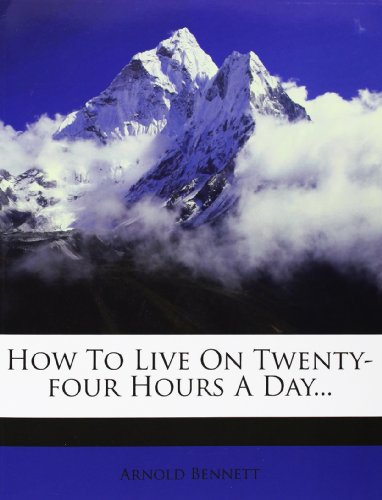
This is a reproduction of a book published before 1923. This book may have occasional imperfections
such as missing or blurred pages, poor pictures, errant marks, etc. that were either part of the original artifact,
or were introduced by the scanning process. We believe this work is culturally important, and despite the imperfections,
have elected to bring it back into print as part of our continuing commitment to the preservation of printed works
worldwide. We appreciate your understanding of the imperfections in the preservation process, and hope you enjoy this valuable book.
++++
The below data was compiled from various identification fields in the bibliographic record of this title. This data is provided as an additional tool in helping to ensure edition identification:
++++
How To Live On Twenty-four Hours A Day
Arnold Bennett
Review of Reviews, 1910
Conduct of life; Time management; Values

An Excellent Book on Time Management Arnold Bennett’s book “How to Live on 24 Hours a Day” is an excellent piece of classic work. Arnold Bennett (for those of you who don’t know) was a popular English novelist in the late 1800’s and early 1900’s.This book contains timeless advice about squeezing the most out of everyday life. Everything from training your brain to concentrate to living happily is discussed in full.The book is short enough to be read in an hour or two (around 80 pages in length), and…
A timless self-help book that can work for everyone. Though it was written 90 years ago, “How To Live” addresses the inadequacies, frustrations, disappointments of people today in all walks of life and it does so with humor and wisdom. A daily dose of “How To Live” is at least as nourishing for the brain and soul as a multi-vitamin for the body. Arnold Bennett created a classic of its kind, a self-help book that really helps.
Time, our most precious commodity, is yours to cherish It is hard to imagine that this little book could be so persuasive. I consider it a classic, and an early precusor to many others that have attempted to demonstrate how time is our own and ours to manage and expand our boundaries of our selves. In the thirty minutes it takes to read, you will be left forever vigilant, and will never sit idle, unless you consciously choose to sit idle, while you ride a train, wait for plane, or drive home from what once may have been a routine. Read it,…